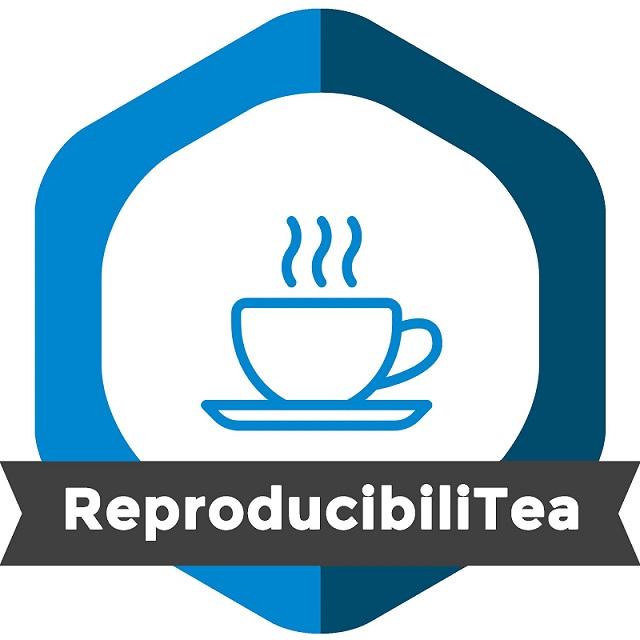ReproducibiliTea

About ReproducibiliTea
Join us at the ReproducibiliTea journal club for an informal discussion about how we can improve transparency, reproducibility and openness in research – with tea (and other refreshments)!
We welcome colleagues and research students from any discipline, regardless of experience or expertise.
We meet on the third Thursday of each month from 12.00 - 13.00 in the Philip Robinson Library Collaborative Learning Hub (unless indicated otherwise.) Participants not able to attend in person are welcome to join us via Teams.
We are in the planning process of this year's programme, which will be announced on Teams and our mailing list. If you are interested in presenting, contact us at ukrn@newcastle.ac.uk.
ReproducibiliTea is run by our UKRN local network leads, Nicola Howe and Clement Lee.
Programme for 2025/26
| Date | Speaker/Paper |
|---|---|
| 16/10/2025 |
Clement Lee, School of Mathematics, Statistics and Physics "The Garden of Forking Paths" by Gelman and Loken (2013) Researcher degrees of freedom can lead to a multiple comparisons problem, even in settings where researchers perform only a single analysis on their data. The problem is there can be a large number of potential comparisons when the details of data analysis are highly contingent on data, without the researcher having to perform any conscious procedure of fishing or examining multiple p-values. We discuss in the context of several examples of published papers where data-analysis decisions were theoretically-motivated based on previous literature, but where the details of data selection and analysis were not pre-specified and, as a result, were contingent on data. |
| 20/11/2025 |
Nicola Howe, NIHR HealthTech Research Centre (HRC) in Diagnostic and Technology Evaluation Experiences of qualitative data anonymisation based on the UK Data service guidance and training. |
| 19/02/2026 |
Natasha Mauthner, Newcastle University Business School. A discussion of open research in the context of participatory action research methodology used in a Wellcome Trust project on Research Culture. Venue: Philip Robinson Library Committee Room |
| 19/03/2026 |
Matt Leach, Comparative Biology Centre. The application of the Sex Inclusive Research Framework to address sex bias in preclinical research proposals. |
| 23/04/2026 |
Delphine Doucet, Research and Scholarly Communications Librarian and UKRN Local Network Lead at the University of Sunderland. Clement Lee, School of Mathematics, Statistics and Physics. Are Nature papers guaranteed to be great? The experience of replicating a paper. |
We are in the planning process for the rest of this year's programme, which will be announced on Teams and our mailing list. If you are interested in presenting, contact us at ukrn@newcastle.ac.uk.
Previous events
2024/25
| Date | Speaker/Paper |
|---|---|
| 19/09/24 |
Franziska Hartung, Centre for Behaviour and Evolution. "The Hitchhiker's guide to Open Science" |
| 17/10/24 |
Chris Moreh, School of Geography, Politics and Sociology. |
| 21/11/24 |
Cong Zhang, School of Education, Communication and Language Sciences. Open Science in Linguistics and Beyond. The movement toward open science is transforming research across disciplines, and linguistics is no exception. This seminar will explore how my collaborators and I have promoted open science in linguistics to enhance transparency and reproducibility. Key practices, such as sharing data, tools, scripts, and manuscripts, will be highlighted as ways to incorporate open science into linguistic research. Additionally, I will introduce the concept of "Big Team Science", exploring how collaborative, large-scale research models can be applied to linguistics to address complex questions and cultivate a more diverse research environment. |
| 05/12/24 |
Vivek Nityananda, Biosciences Institute. Incentivising good research practices. What we can do to encourage open and more rigorous research |
| 16/01/25 |
Kirsten Brandt, Population Health Sciences Institute; Caroline Allen, School of Psychology. Personality traits and acceptance of a subject-specific disruptive hypothesis |
| 20/02/25 |
David Smailes UKRN local network lead at Northumbria University. |
| 20/03/25 |
Chris Harrison, School of Mathematics, Statistics and Physics. Audio Universe: An Open Approach to Turning the Universe into Sound Postponed: This meeting has been postponed due to Newcastle University UCU strike action. A new date will be announced shortly. |
| 17/04/25 |
Helen Gray, School of Natural and Environmental Sciences. Exploring Open Science in Applied Ethology: Practice and Attitudes among Researchers Transparency is critical for impactful research. This is particularly relevant for animal-based research fields, like Applied Ethology, where ethical obligations demand both scientific integrity and responsible use of animals. While Open Science practices are well-established in some fields, they remain limited in the field of Applied Ethology, for which there is also a lack of standardised guidelines and training. To assess the prevalence of different Open Science practices in this field, we surveyed attendees of the 2021 virtual International Society for Applied Ethology Congress. |
| 15/05/25 |
Clement Lee, School of Mathematics, Statistics and Physics. [Retracted] High replicability of newly discovered social-behavioural findings is achievable. Postponed: This meeting has been postponed due to Newcastle University UCU strike action. A new date will be announced shortly. |
| 19/06/25 |
Jordan Cuff, School of Natural and Environmental Sciences. |
2023/24
| Date | Paper |
|---|---|
| 21/09/23 | Bishop, DVM. (2018). Fallibility in Science: Responding to Errors in the Work of Oneself and Others. Advances in Methods and Practices in Psychological Science, 1(3), 432-438. DOI: 10.1177/2515245918776632. (Accepted manuscript) |
| 19/10/23 | Allen, C, Mehler, DMA (2019) Open science challenges, benefits and tips in early career and beyond. PLoS Biology 17(5): e3000246. DOI: 10.1371/journal.pbio.3000246 |
| 16/11/23 | Kowalczyk, OS. et al. (2022) What senior academics can do to support reproducible and open research: a short, three-step guide. BMC Research Notes 15, 116. DOI: 10.1186/s13104-022-05999-0 |
| 15/02/24 | Hagger, MS (2022) Developing an open science ‘mindset’, Health Psychology and Behavioural Medicine, 10:1, 1-21, DOI: 10.1080/21642850.2021.2012474 |
| 21/03/24 | Mirko Gabelica, M et al. (2022) Many researchers were not compliant with their published data sharing statement: a mixed-methods study. Journal of Clinical Epidemiology. 150, 33-41. DOI: 10.1016/j.jclinepi.2022.05.019 |
| 18/04/24 | Lakens, D (2023) Is my study useless? Why researchers need methodological review boards. Nature 613, 9, DOI: 10.1038/d41586-022-04504-8 |
| 16/05/24 | Schwab, S et al. (2022) Ten simple rules for good research practice. PLoS Computational Biology 18(6): e1010139. DOI: 10.1371/journal.pcbi.1010139 |
| 20/06/24 | Bring a paper from your discipline for a roundtable discussion of how open research practices were applied and what we can learn from it. |
2022/23
| Date | Paper |
|---|---|
| 20/10/22 | Ioannidis JPA (2005) Why Most Published Research Findings Are False. PLoS Med 2(8): e124. https://doi.org/10.1371/journal.pmed.0020124 |
| 17/11/22 | Wagenmakers , E.-J., Dutilh, G., & Sarafoglou, A. (2018). The Creativity-Verification Cycle in Psychological Science: New Methods to Combat Old Idols. Perspectives on Psychological Science, 13(4), 418–427. https://doi.org/10.1177/1745691618771357 |
| 15/12/22 | Klein, Richard A., et al. (2018) Many labs 2: investigating variation in replicability across sample and setting. Advances in Methods and Practices in Psychological Science. 1(4), 443-490. https://doi.org/10.1177/2515245918810225 |
| Postponed due to UCU strike action | Wilson G, Bryan J, Cranston K, Kitzes J, Nederbragt L, et al. (2017) Good enough practices in scientific computing. PLOS Computational Biology 13(6), https://doi.org/10.1371/journal.pcbi.1005510 |
| 20/04/23 | Zwaan, R. A., Etz, A., Lucas, R. E., & Donnellan, B. (2018, August 1). Making Replication Mainstream. Preprint. https://doi.org/10.31234/osf.io/4tg9c |
| 18/05/23 | Tennant JP, Waldner F, Jacques DC et al. The academic, economic and societal impacts of Open Access: an evidence-based review. F1000Research 2016, 5:632. https://doi.org/10.12688/f1000research.8460.3 |
| Postponed due to UCU strike action | Hussey, I., & Hughes, S. (2018, November 19). Hidden invalidity among fifteen commonly used measures in social and personality psychology. Preprint. https://doi.org/10.31234/osf.io/7rbfp |
